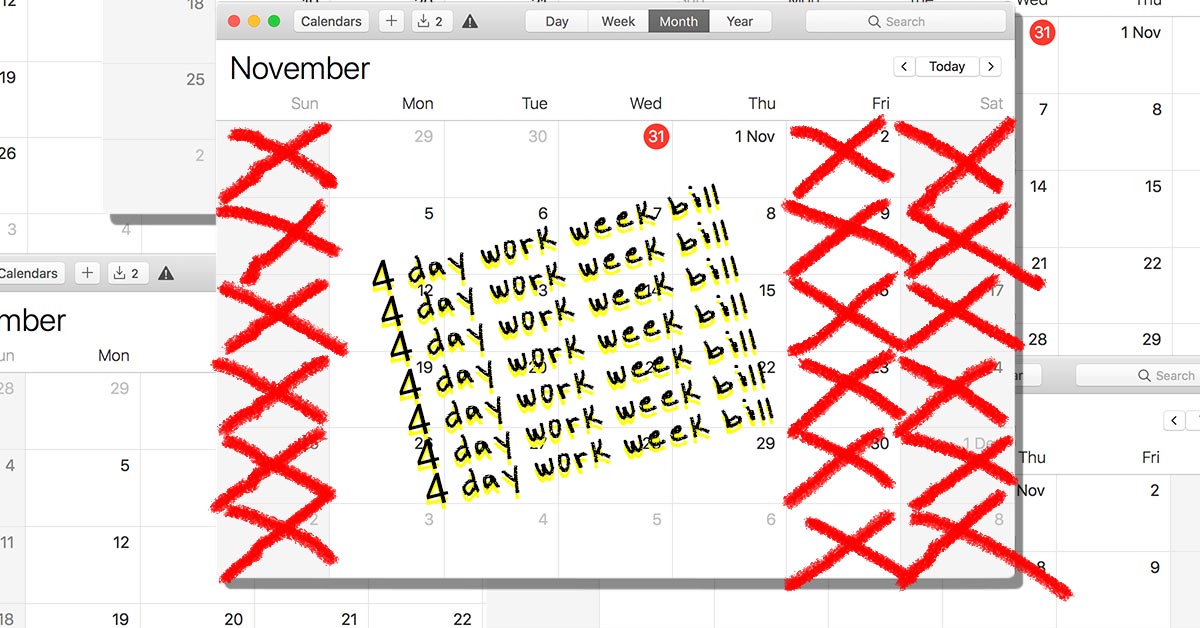More importantly: What does the 4-day work week bill mean for you?
The 4-day work week bill has been thrown around pretty often recently. And why not? Countries and companies around the world have been raving about the results.
A company in New Zealand, for example, tried it out for eight weeks, and what they found out was pretty amazing. The employees reported a better sense of work-life balance, jumping from a positive 54 percent to an even better 78 percent. Stress went down and job performance slightly improved, so there were happy employees and happy employers all around.
So with our own House of Representatives approving the third and final reading of a local 4-day work week bill in August, some things seem to be looking up. We know what you’re thinking: “Constant long weekends? Sign us up!”
Sorry to break it to you, kids, but most of you are wrong.
https://giphy.com/gifs/shrug-shrugging-smile-enZ3A3ihJiUgw
RELATED: Is Working In The Philippines Still Financially Viable?
The bill in non-lawyer terms
Called House Bill 6152, the shorter work week technically aims to “promote competitiveness, efficiency and productivity in business and industries.”
Here’s the deal:
- The compressed work week is an optional for companies
- Companies that do want to implement the 4-day work week must get clearance from the Department of Labor and Employment
- The bill allows employees to work for just four days, but they must render 12 hours of work every day
- The Labor Code only requires 40 to 48 hours of work a week, so anyone that goes beyond 48 hours can (and should) file for overtime pay
- The bill doesn’t specify what day of the week will be given off
In other words, don’t start thinking it will all be easy sailing should your company apply or offer the 4-day work week. You’ll be required to render twelve hours of work every single day, after all. That means leaving at 8pm or 9pm for most of us—and I’ve heard fair complaints about getting home at those times. And if you’re thinking, “Hey, at least I’ll get Mondays or Fridays off,” well… it’s only a possibility. It could be any other day of the week.
https://giphy.com/gifs/diva-snap-31wVvW0sOur7O
RELATED: We Asked Your Career Pegs About Their Career Pegs
Would it even work?
Some groups, particularly the Employers Confederation of the Philippines (ECOP), have already gone on the record to state they are opposed to the 4-day work weeks. Chairman Donald Dee went on the record to say they had already experimented with the idea 10 years ago. Twelve hours is a lot to require of someone, shown by the fainting spells some workers of the group experienced.
If the point is to allow people to spend more time with their families on the weekends, there’s this question: What’s the point of an extra day when you leave before the kids wake up and get home when they’re already asleep four days out of seven?
And if the point is to ease traffic, everyone would still be getting out at the same times—just two hours later. Then again, having an additional day of cruising traffic doesn’t at all seem that bad, huh?
https://giphy.com/gifs/hugh-laurie-house-md-gregory-mRbzaekCIvrr2
RELATED: Can Creatives Make It In Corporate?
But wait, we’re talking about the Philippines here
When it comes to the financial side of things, we have to understand that millions of Filipinos would suffer from this practice. In a country where most contracts are defined by “no work, no pay” or daily wages, losing one day is detrimental to families around the country.
Financial Times columnist Simon Kuper explained it best: A compressed work week “won’t help the poorest-paid workers who can’t afford to work less.” And darling, don't forget that you’re living in a country where 22 million people live below the poverty line.
So, 4-day work week? Maybe not—at least not for every company and every employee. Thank God it’s only optional, huh? So here’s to hoping businesses don’t take advantage of the bill for their own personal gain.
Art Alexandra Lara


















